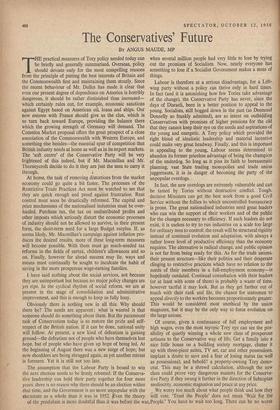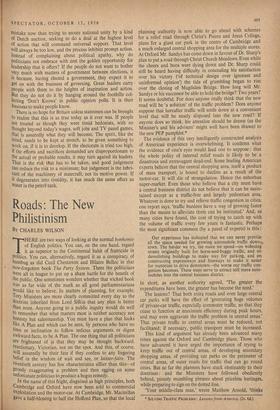The Conservatives' Future
BY ANGUS MAUDE, MP THE practical measures of Tory policy needed today can be briefly and generally summarised. Overseas, policy should deviate only for the most compelling reasons from the principle of putting the best interests of Britain and the Commonwealth first and maintaining them stoutly. Since the recent behaviour of Mr. Dulles has made it clear that even our present degree of dependence on America is horribly dangerous, it should be rather diminished than increased— which certainly rules out, for example, economic sanctions against Egypt based on American oil, loans and ships. Our new entente with France should give us the clue, which is to turn back toward Europe, providing the balance there which the growing strength of Germany will demand. The Common Market proposal offers the great prospect of a close association of the Commonwealth with Western Europe, and something else besides—the essential spur of competition that British industry needs at home as well as in its export markets. The 'soft centre' of the Conservative Party will be very frightened of this indeed, but if Mr. Macmillan and Mr. Thorneycroft decide to do it they are just the men to carry it through.
At home, the task of removing distortions from the market economy could go quite a bit faster. The processes of the Restrictive Trade Practices Act must be watched to see that they are quick enough and proof against frustration. Rent control must soon be drastically reformed. The capital and price mechanisms of the nationalised industries must be over- hauled. Purchase tax, the tax on undistributed profits and other imposts which seriously distort the economic processes of industry should not be allowed to survive, in their present form, the short-term need for a large Budget surplus. If, as seems likely, Mr. Macmillan's campaign against inflation pro- duces the desired results, more of these long-term measures will become possible. With them must go much-needed tax reforms in the fields of surtax, children's allowances and so on. Finally, however far ahead success may lie, ways and means must continually be sought to inculcate the habit of saving in the more prosperous wage-earning families.
I have said nothing about the social services, not because they are unimportant but because no major policy changes are yet ripe. In the cyclical rhythm of social reform, we are at present in the stage of consolidation and administrative improvement, and this is enough to keep us fully busy.
Obviously there is nothing new in all this. Why should there be? The needs are apparent : what is wanted is that someone should do something about them. But the paramount task of Conservatism today is to restore the pride and self- respect of the British nation. If it can be done, national unity will follow. At present, a new kind of defeatism is gaining ground—the defeatism not of people who have themselves lost hope. but of people who have given up hope of being led. At the beginning of August there was a new surge of hope; but now shoulders are being shrugged again, as yet another retreat is foreseen. Yet it is still not too late.
The assumption that the Labour Party is bound to win the next election needs to be firmly rebutted. if the Conserva- tive leadership can hold their party together for four more years. there is no reason why there should be an election within that time, and the Government is no more unpopular with the electorate as a whole than it was in 1952. ?Even the theory of the pendulum is more doubtful than it was before the war,People.' You have to wait too long. There can be no worse when several million people had very little to lose by trying out the promises of Socialism. Now, nearly everyone has something to lose if a Socialist Government makes a mess of things.
Labour is therefore at a serious disadvantage, for a Left- wing party without a policy can thrive only in hard times. In fact (and it is astonishing how few Tories take advantage of the change), the Conservative Party has never, since the days of Disraeli, been in a better position to appeal to the young. Socialists, still bogged down in the past (as Desmond Donnelly so frankly admitted), are so intent on outbidding Conservatives with promises of higher pensions for the old that they cannot keep their eye on the needs and aspirations-of the young and energetic. A Tory policy which provided the right blend of idealistic leadership and material incentive could make very great headway. Finally, and this is important in appealing to the young, Labour seems determined to abandon its former priceless advantage of being the champion of the underdog. So long as it pins its faith to bureaucratic planning, vast State trading monopolies and trade union juggernauts, it is in danger of becoming the party of the unpopular overdogs.
In fact, the new overdogs are extremely vulnerable and can be tamed by Tories without destructive conflict. Tough, decisive Ministers can get the best work from a good Civil Service without the follies to which uncontrolled bureaucracy is prone. The great nationalised industries need great leaders who can win the support of their workers and of the public for the changes necessary to efficiency. If such leaders do not exist, it is useless to try to run industries on a scale too large for ordinary men to control; the result will be structural rigidity instead of continual evolution and adaptation, with always a rather lower level of productive efficiency than the economy requires. The alternative is radical change, and public opinion is not far from being ready for this. As for the trade unions, their present structure—like their politics and their desperate clinging to restrictive practices which have no relation to the needs of their members in a full-employment economy—is hopelessly outdated. Continual consultation with their leaders (or at least with some of them) is probably a waste of time, however tactful it may look. But as they get farther out of touch with their rank and file, the chance for statesmen to appeal directly to the workers becomes proportionately greater. This would be considered most unethical by the union magnates, but it may be the only way to force evolution on the large unions.
Of course, given a continuance of full employment and high wages, even the most myopic Tory eye can see the pos- sibility of quietly winning a whole new class of prosperous artisans to the Conservative way of life. Get a family into a nice little house on a building society mortgage, clutter it up with three-piece suites, TV set, car and other possessions. implant a desire to save and a fear of losing status (as well as possessions), and behold! a property-owning Tory demo- crat. This may be a shrewd calculation, although the new class could prove very dangerous masters for the Conserva- tive Party if they swung it farther in the direction of Subtopian mediocrity, economic stagnation and peace at any price.
We worry too much about what people think and how they will vote. 'Trust the People' does not mean 'Wait for the mistake now than trying to secure national unity by a kind of Dutch auction, seeking to do a deal at the highest level of action that will command universal support. That level will always be too low, and the process inhibits prompt action. Instead of complaining about political apathy, why do politicians not embrace with zest the golden opportunity for leadership that it offers? If the people do not want to bother very much with matters of government between elections, it is because, having elected a government, they expect it to get on with the business of governing. Great leaders carry • people with them to the heights of inspiration and action. But they do not do it by hanging around the foothills col- lecting 'Don't Knows' in public opinion polls. It is their business to make people know.
There is no hope for Britain unless statesmen can be brought to realise that this is as true today as it ever was. If people are treated as though they were timid hedonists, with no thought beyond today's wages, soft jobs and TV panel games, that is assuredly what they will become. The spirit, like the mind, needs to be kept at stretch, to be given something to work on, if it is to develop. If the electorate is tried too high, if the efforts and sacrifices demanded are disproportionate to the actual or probable results, it may turn against its leaders. That is the risk that has to be taken, and good judgement can reduce the risk to a minimum; but judgement is the lubri- cant of the machinery of statecraft. not its motive power. If it degenerates into timidity, it has much the same effect as Water in the petrol tank.











































 Previous page
Previous page